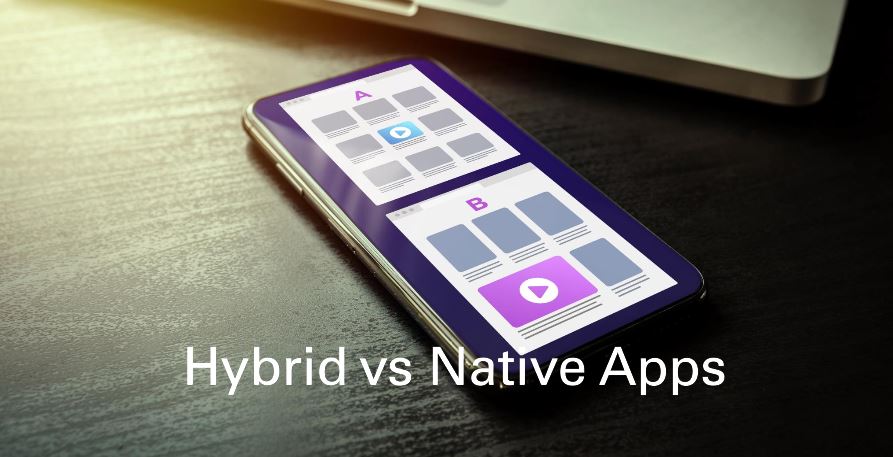Digitalization benefits organizations and individuals in today’s digital age. It’s amazing how a single tap on a smartphone can advertise, showcase products and services, encourage sales, and enable global transactions. Smartphones let users organize calendars, make Skype calls, send emails, browse social media, play games, and learn.
Business owners have recognized the importance of mobile apps in this digital age and have worked to meet rising demand. But this raises the question for businesses to choose between app development platforms.
There are mainly two app development choices: the Hybrid app development and the Native app development. Choosing between these can be time-consuming and difficult, thus, we did the hassles for you.
This blog will help you understand which development choice is best. So, let’s dive into the details:
What is a Hybrid App?
Hybrid app development includes creating applications that blend the functionality of mobile apps with the ease of websites. Both web browsers and app stores allow users to access these hybrid applications. They are generally developed utilizing web application-like technologies like JavaScript and HTML5.
The fact that hybrid apps often require less maintenance is a good choice for startups. They are, however, comparatively slower than native apps as their performance depends upon the user’s web browser.
Benefits of hybrid apps
Rapid Time to Market:
Hybrid app development is a fantastic option for businesses looking to release their Minimum Viable Product (MVP) swiftly. It enables quick app development and deployment, providing a quick entry into the market.
Simple to Maintain:
Due to hybrid apps’ reliance on web technology, maintenance is generally simple. They differ from native and cross-platform programs, which frequently need more extensive coding in that they are simpler.
Cost-effectiveness and ease of development:
It is especially advantageous for startups with tight budgets to streamline costs during hybrid app development. It is unnecessary to allocate separate resources to develop the app’s multiple platform-specific versions. With the use of hybrid app development frameworks, developers can produce a single version that is compatible with several platforms.
Cost Efficiency and Development Ease:
Hybrid apps combine the advantages/features of native and online apps to offer the best of both worlds. On both the Android and iOS platforms, they provide a smooth and enhanced user experience. These applications often have a minimalist user interface to guarantee that images and content load quickly.
What is a Native App?
A native app is a software program built for a specific operating system (OS) and device.
In this realm, developers wield the power to seamlessly tap into the core hardware components of smartphones, unleashing the full potential of GPS, proximity sensors, cameras, microphones, and more.
Benefits of Native Apps
Speedy Performance
Native mobile apps boast swiftness as they steer clear of the complexity often found in hybrid and cross-platform counterparts. Elements within these apps load in a flash, thanks to advanced preloading. Their rapid development pace and cost-effectiveness make them a prime choice for startups.
Seamless Offline Functionality
Native apps are able to work seamlessly without an internet connection. Users can access all app features even in aeroplane mode or offline environments. This offline support is invaluable to individuals in regions with limited internet access or remote areas.
Intuitiveness and Interactivity
Native apps deliver a superior user experience, catering to emerging entrepreneurs’ aspirations. Designed exclusively for a specific operating system, they adhere to platform-specific guidelines, ensuring a refined and familiar user experience. Users can effortlessly interact with these apps using gestures and actions they already know.
Minimal Bug Headaches
Managing two distinct codebases can be a headache, but native app development keeps it simple with just one codebase. This approach minimizes the occurrence of bugs, offering a smoother user experience.
Enhanced Security
Native app development relies on robust technologies such as HTML5, JavaScript, and CSS, and thus guarantees user data protection.
Hybrid v/s Native App
Several considerations that could greatly influence your project are involved while deciding between hybrid and native app development. Consider the following factors to understand the differences:
Time and expense incurred in development:
The costs and development times for hybrid apps are typically lower. Based on a single code base, they excel in effectiveness and maintenance-free operation. Native apps, however, take more time and money to develop because they need unique codebases for each platform.
The User Experience:
Native apps typically provide the best user experiences. Taking full advantage of hardware capabilities and screen sizes, they are painstakingly designed for particular app shops. Due to their one-size-fits-all design, hybrid apps, however effective, could not provide a seamless user experience.
App Type (Free or Paid):
Native apps are typically advised if you want to publish a paid app on stores like the App Store. Their user interface (UI) is excellent. Hybrid app development may be a good choice for free apps.
Target Platforms:
Consider developing a web or hybrid app if your company wants to reach a large audience across Android, Apple, and Windows platforms. This strategy uses a single code base, making it easier to deploy your software across many platforms. The development of native apps, in contrast, necessitates special programming for each platform (such as Objective C for iOS and JavaScript for Android).
Distribution through App Stores:
You must create a mobile app rather than relying exclusively on a mobile-optimized Responsive Web Design (RWD) application if your distribution plan calls for using official App Stores. While RWD applications are accessed through web browsers, app stores offer a centralized platform for app distribution.
Utilization of Native Device Features:
Your best options are a native or hybrid mobile app if your app needs access to native device functionalities like the camera or GPS. Effective access to these device functionalities is difficult for web apps.
Existence of Developers:
When making a choice, consider the availability of specialized mobile app developers. If your business wants to be present across various platforms but lacks experts skilled in native app development, choosing a hybrid mobile app can be easier. By doing this, you may avoid learning platform-specific languages and use your existing coding skills, such as JavaScript, HTML, and CSS.
In conclusion, your project needs, such as development resources, user experience goals, target platforms, and desired app features, will determine whether you should design a hybrid or native app. To select a choice that supports your business goals, carefully consider these considerations.
When to Consider Developing a Hybrid App?
- Seamless Cross-Platform Operation: If your goal is to have your app work seamlessly on various platforms and you’re pressed for time, hybrid app development becomes a compelling choice.
- Distribution Through App Stores: When your strategy involves distributing your app through app stores, especially if it’s a web app, hybrid development is a practical route.
- Broader Audience Reach: If you’re targeting a diverse audience that uses your app on both web and mobile devices, a hybrid approach is advantageous as it caters to both platforms.
- Minimum Viable Product (MVP): When you need to quickly test your project idea with a Minimum Viable Product (MVP), hybrid app development allows for a speedy launch and assessment.
- Utilizing Native Features: When you require access to the device’s native features, such as GPS or camera, but still want the flexibility of a hybrid solution, hybrid app development can bridge that gap.
When to Consider Developing a Native App?
- Exceptional First Impression: If your target audience is using your app for the first time & you aim to impress them with the best possible app experience, native app development is the way to go.
- Platform-Specific Coding: When your strategy involves coding specifically for a single platform, perhaps due to its unique requirements or user base, native app development provides the precision needed.
- 3D Games and Animations: For businesses diving into the realm of 3D games and animations, native app development offers the performance and capabilities required for immersive user experiences.
- Scaling with VC Investment: If your plan involves attracting a wide base of Daily Active Users (DAUs), targeting venture capital (VC) investors for product funding, and creating an app that’s easy to learn yet intuitive, native app development can help you scale effectively.
- Leveraging Device-Specific Functionalities: When your app heavily relies on device-specific functionalities, such as advanced GPS tracking or complex camera interactions, native app development ensures optimal utilization of these features.
The Conclusion
We have discussed all the benefits and cases when Hybrid app development is suitable and when Native app development. The choice totally depends upon your business needs, budget, and type of app you require and if you still face issues while making a choice or want to get started with the development process, ABC is your right hand.




